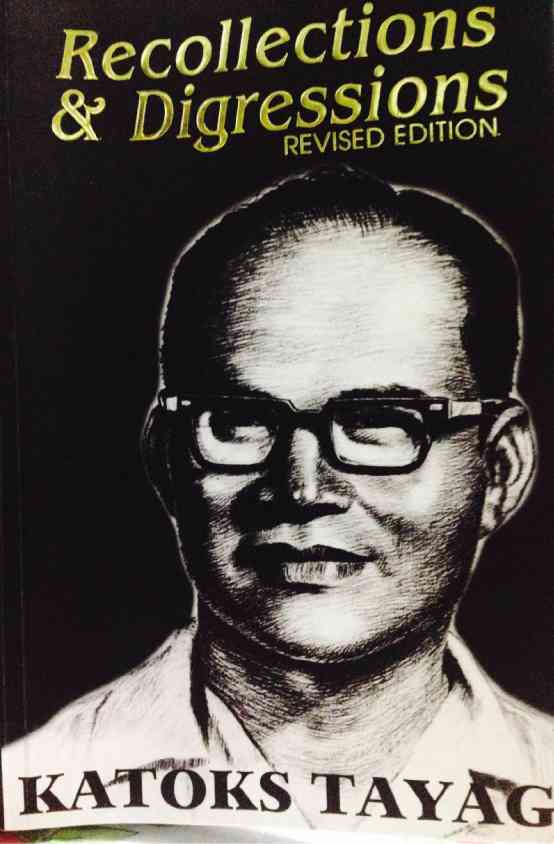RENATO DAYRIT TAYAG—“Katoks” to family, friends, enemies, Ferdinand Marcos and Ninoy Aquino—is a well-remembered man in Angeles City, his birthplace.
On his birth centennial on Oct. 9, his 12 children, the Center for Kapampangan Studies (CKS) of the Holy Angel University and Mayor Edgardo Pamintuan launched the revised edition of Tayag’s “Recollections & Digressions.”
The book’s front and back covers carried a 1964 pencil sketch of Tayag by Angeles historian Daniel Dizon and the first edition’s portrait of Tayag by his long-time friend, writer and painter E. Aguilar Cruz, and a blurb by editor Jose Luna Castro who completed the famous triumvirate of their time.
Because he was born on a fiesta, they timed the book launch with the month-long Fiestang Kuliat, for which three major feasts are celebrated for the Our Lady of La Naval, Holy Guardian Angels and Apung Mamacalulu (Dead Christ).
How did Tayag get the nickname Katoks? That was care of his classmates at the Pampanga High School. A defender of victims of bullying, they called him Katoks, after the Roman statesman Cato. He pleaded with them not to forget the “s” because, without it, the name would have meant someone who is crazy.
Remembering Tayag began immediately after his death on Aug. 13, 1985.
The then National Historical Institute (NHI) honored him in 1986 by installing an official commemorative plaque at a wall past the front steps of the Angeles City library. A room here displays his books, photos and other personal pieces.
‘Awesome’
Tayag’s life, even by the standards of today’s millennials, is “awesome,” former NHI chief Serafin Quiason said.
The NHI’s inscription says: “Writer, lawyer, soldier and sportsman;” Finished law at the University of the Philippines 1939, member of the UP Writers Club, edited the Collegian and Literary Apprentice, fought in [World War II] in Bataan as field artillery officer, survived the Death March, a prisoner of war in Camp O’Donnel (Tarlac), donated a lot for the city’s library.”
The lot donation came as he traced the 300 or so relatives of the original owner to convince the court to have the property titled to his name. Before donating “Brookside” for the youth, it was where he and his wife, Adoracion Suarez, raised their children.
UP diehard
Like his father, Dr. Jose Tayag, Katoks was a UP diehard. All the Tayag children were educated at UP and have become business and civic leaders. Claude, one of Tayag’s children, got his father’s fine taste for food and arts.
NHI also portrayed Tayag as “marangal” (honorable) and “kapuri-puri” (praiseworthy).
Details were, of course, left out, best discovered in several books he wrote of his beloved Angeles, of ordinary and famous people, of just about anything in the country and his clandestine journey to China with three other journalists in 1964 that even the rabid anticommunist President Diosdado Macapagal failed to stop.
“Recollections & Digressions” was first published by the Philippine National Bank where Tayag was a director.
Castro had thanked Tayag for writing about the contradictions of Angeles City and its neighbor Clark Air Base and for correcting a wrong perception of the Macabebe Scouts.
Robby Tantingco, CKS executive director, considers “The Vanishing Pampanga Nation” an iconic writeup for present generations who work to preserve Kapampangan identity, culture and history.
The launch, he says, signifies the reconciliation of the Tayag and Nepomuceno families. They buried the hatchet in silence. Tayag’s “The Sinners of Angeles” gave clues as to what might have caused the rift.
The friendship of Tayag and Marcos dated back to UP where they were classmates in law school and fraternity brothers in the Upsilon Sigma Phi.
Tayag brought him law books to review while Marcos was in jail while defending himself in a murder case.
They became law partners together with Angel Limjoco, another Upsilonian.
In Camp O’Donnel, this Kapampangan-Ilocano friendship deepened, with Marcos allowing Tayag to pretend he was the former so he could briefly leave the camp, see his relatives and bring back food for the rest of the prisoners.
But the man has a dislike for politics. Tayag’s sons, Abong (Renato Jr.) and Gerry (German), said their father had turned down Marcos’ offer to be the minister of defense.
There is no mention or photograph of Ninoy Aquino, another fraternity brother, in “Recollections.” Aquino, however, dropped by Brookside before his secret meetings with Huk leader Luis Taruc. In Boston, where Aquino took exile in the early 1980s, Tayag carried his message to Marcos.
“It was a complicated situation,” Abong said of the ties with Marcos and Aquino.
In the many things he did and made, Tayag was foremost a writer.
Said sociologist Randy David of his wedding godfather: “Katoks wrote social history long before this mode of writing became a branch of Philippine history, which, as we all know tends to be focused on the political. There are not too many Filipino writers like him who have an unerring sense of place and time, and a mastery of the written word to match it.”
Tayag’s fifth child, Doreen, says: “If my father were alive, he would not want this much attention.”
